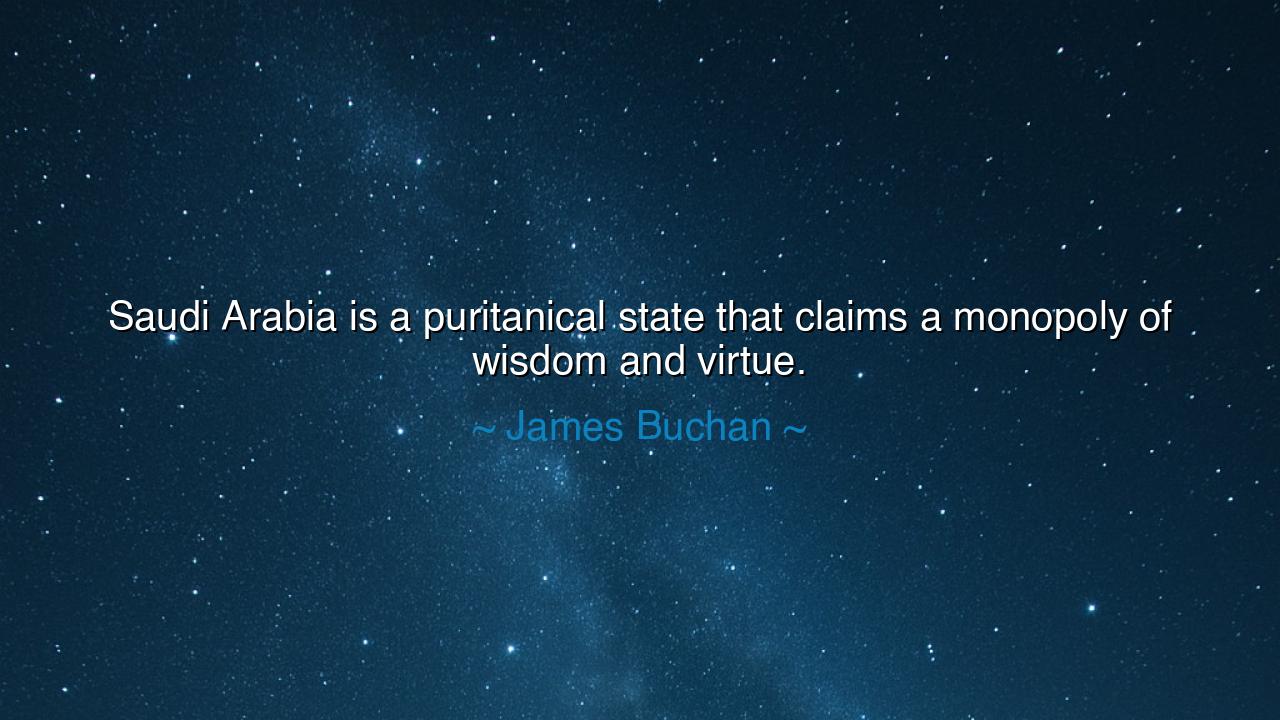
Saudi Arabia is a puritanical state that claims a monopoly of






Hearken, O children of the ages, to the words of James Buchan, who casts his discerning gaze upon the lands of Saudi Arabia, a realm where puritanical rule and the claim of absolute wisdom and virtue shape the life of its people. He teaches that when a state asserts a monopoly over truth and morality, it binds not only the body but the spirit, shaping thought and conduct according to a singular vision, often at the expense of diversity, freedom, and the flourishing of individual conscience.
Buchan reminds us that to claim sole possession of virtue is to claim mastery over the hearts of men—a dangerous endeavor, for no mortal or earthly institution may encompass the full measure of wisdom. In such a state, the voice of dissent is subdued, the richness of perspective silenced, and the human spirit may be constrained beneath the weight of rigid orthodoxy. History warns that monopolies of thought, however sanctified, can lead to stagnation, fear, and injustice.
Consider the historical example of the Puritan Commonwealth of England, where strict moral codes governed every aspect of life, and the claim to moral and spiritual authority was wielded as power. While some virtues were cultivated, the suppression of diverse voices and rigid enforcement of orthodoxy sowed unrest and, in time, resistance. Buchan’s observation echoes this ancient truth: the assertion of monopoly over wisdom and virtue often conceals the perils of overreach and inflexibility.
Yet within this warning lies a lesson for all peoples and rulers. The pursuit of virtue must be tempered by humility, reflection, and openness to the counsel of many minds. A society flourishes not when authority proclaims absolute truth, but when it balances guidance with freedom, and principle with compassion. The strength of a nation is measured not by the rigidity of its rule, but by the breadth of insight it allows and the dignity it grants its citizens.
O children of the future, carry this teaching in your hearts: beware the allure of claims to absolute wisdom, for no mortal may hold the totality of truth. Let your eyes remain vigilant, your mind open, and your spirit unshackled. In the cultivation of discernment, courage, and humility, you honor the eternal pursuit of virtue, not as an instrument of control, but as a light guiding the hearts and lives of all.
If you desire, I can also craft a visual, ancient scroll-style presentation of this passage to capture the heroic, timeless, and deeply reflective essence of Buchan’s teaching on authority, virtue, and wisdom.






VTHoa Vo thi
The idea that Saudi Arabia claims a monopoly on wisdom and virtue makes me think about how countries often define themselves through a singular narrative of purity or moral superiority. But does this lead to isolationism or a resistance to outside influences? How does the world respond to a nation that positions itself as morally flawless? I’d be curious to explore whether this approach helps or hinders Saudi Arabia’s international relationships and its role in global discussions.
HTNguyen Thi Huyen Trang
Buchan’s description of Saudi Arabia as a puritanical state that claims a monopoly on wisdom brings to mind the tension between religion and governance. But I wonder — can any state truly have a monopoly on virtue, or does that belief in itself lead to corruption? When a nation claims moral superiority, does it allow room for critique or dialogue, or does it suppress dissent? I think there’s a fine line between self-righteousness and accountability.
TH09_Nguyen Thanh Hoa
This quote made me reflect on how states often use claims of wisdom and virtue as a way to legitimize their authority. But in Saudi Arabia’s case, how much of this is genuinely felt by the leadership, and how much is strategically used to consolidate power? Is this just a way to maintain control over a large, diverse population? How does the international community view Saudi Arabia’s approach to governance and morality?
TNTran Ngoc
James Buchan’s perspective seems a bit harsh, yet it also brings up an important question: does a state’s claim to virtue inevitably lead to authoritarianism? I’m also wondering — is there any flexibility within Saudi Arabia’s strict adherence to these values, or is it rigid? How does this puritanical approach affect Saudi citizens' personal freedoms and their ability to challenge the status quo without fear of punishment or repression?
TTThuy tien
I find this quote thought-provoking, as it highlights the tension between Saudi Arabia’s religious conservatism and its global aspirations. But I’m curious — is this puritanical stance actually beneficial for the country’s long-term development, or does it limit progress and social freedom? Can a society claim moral superiority without stifling its own growth and diversity? I’d love to hear a deeper exploration of how this impacts the people living under such a regime.